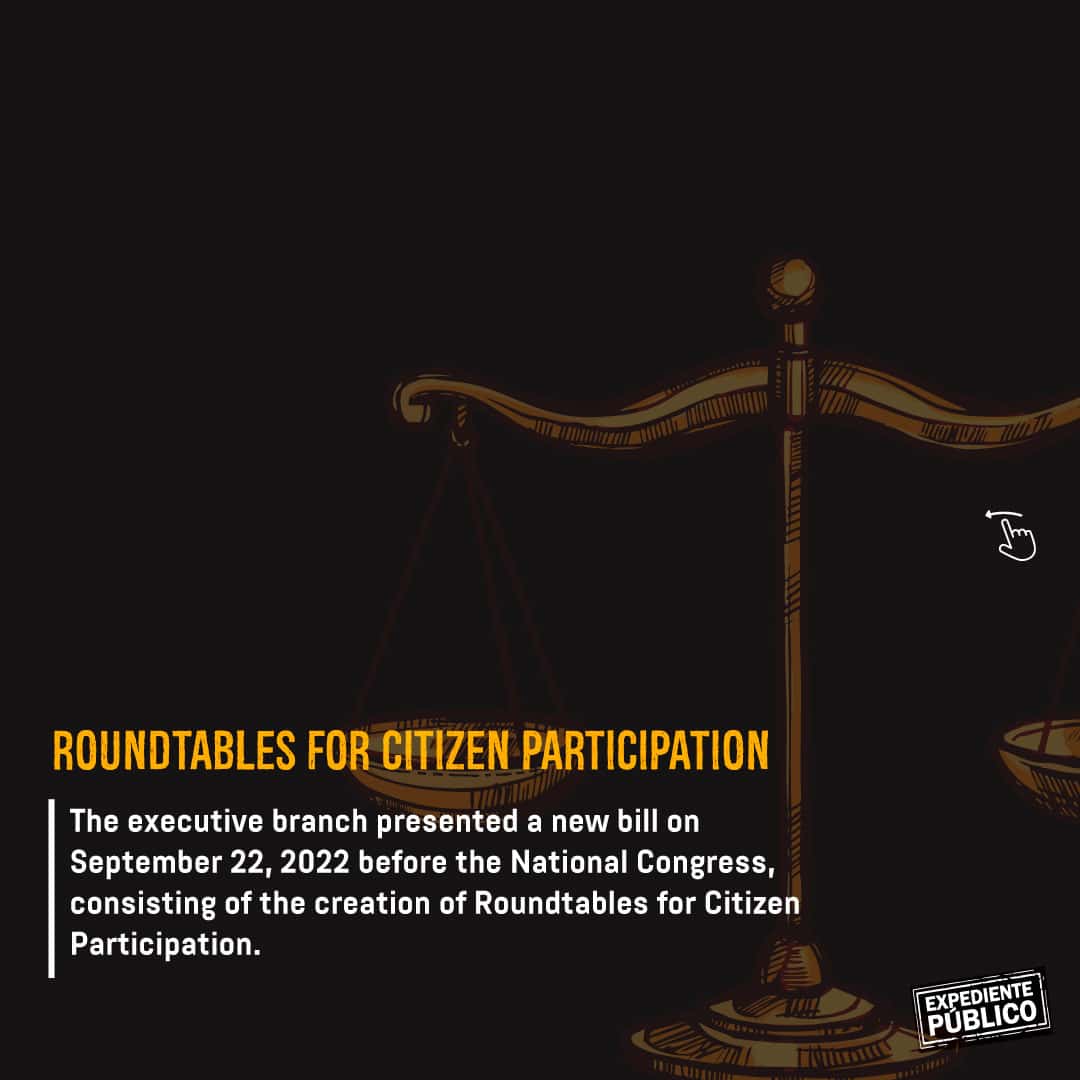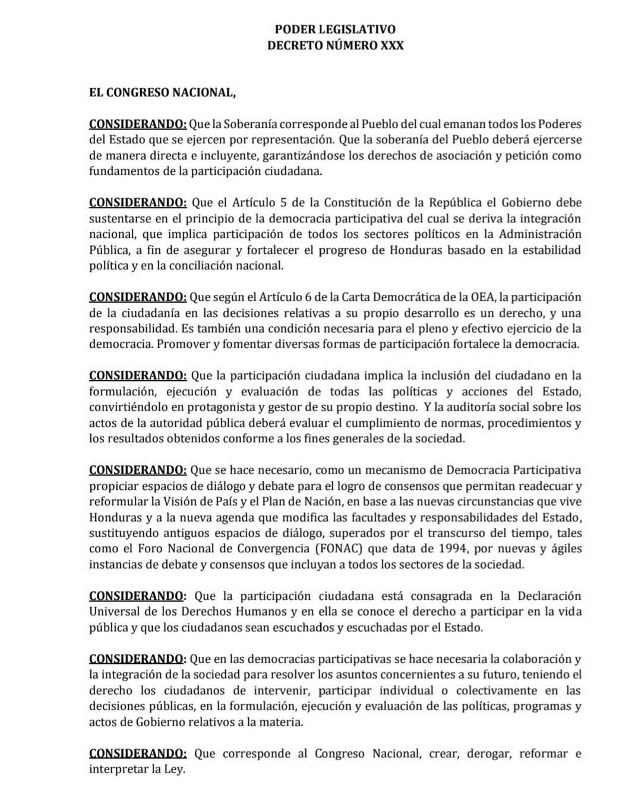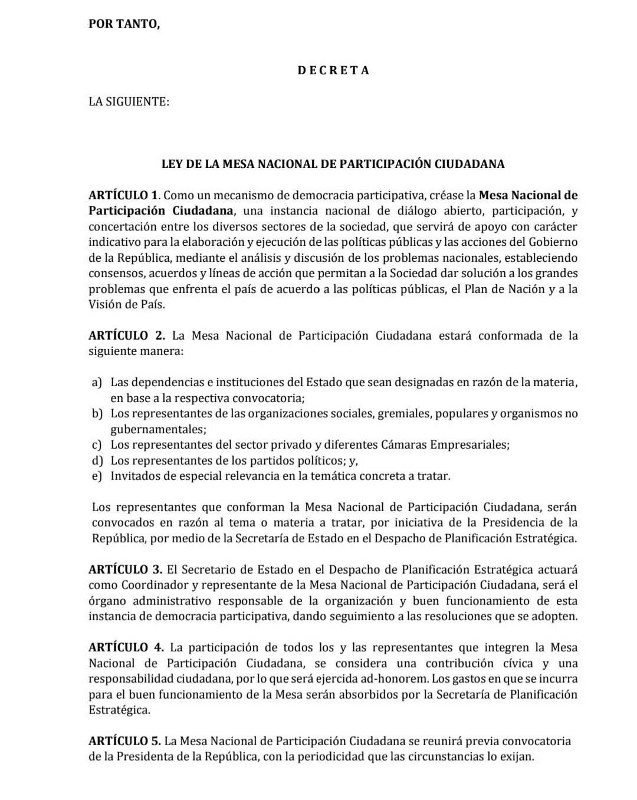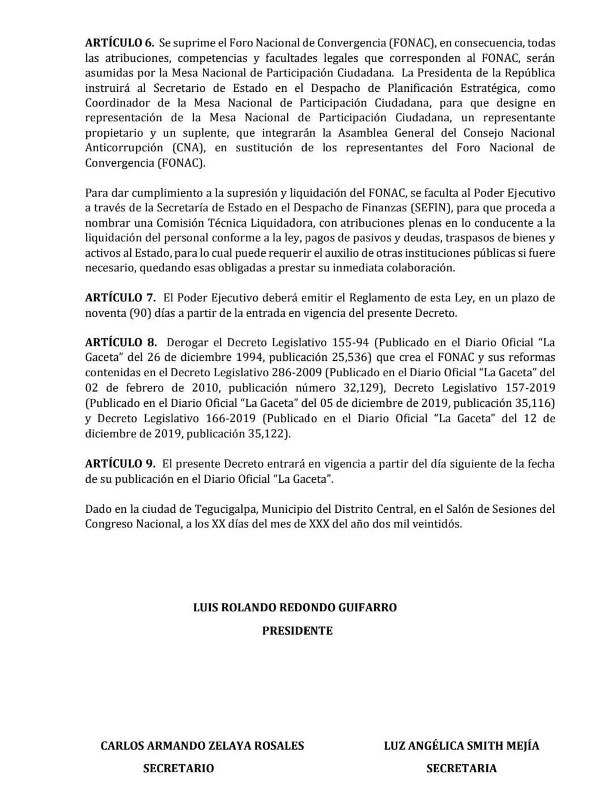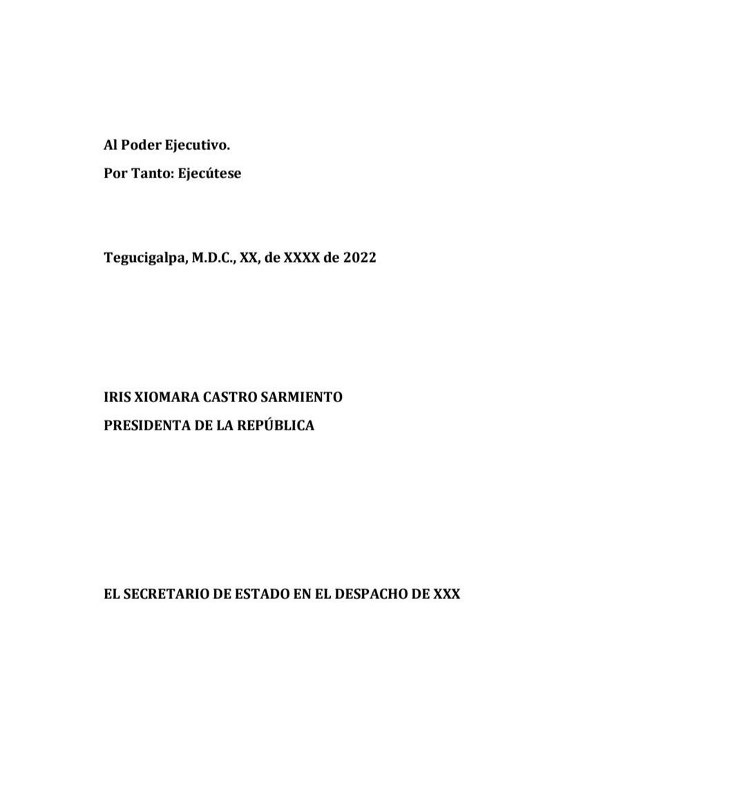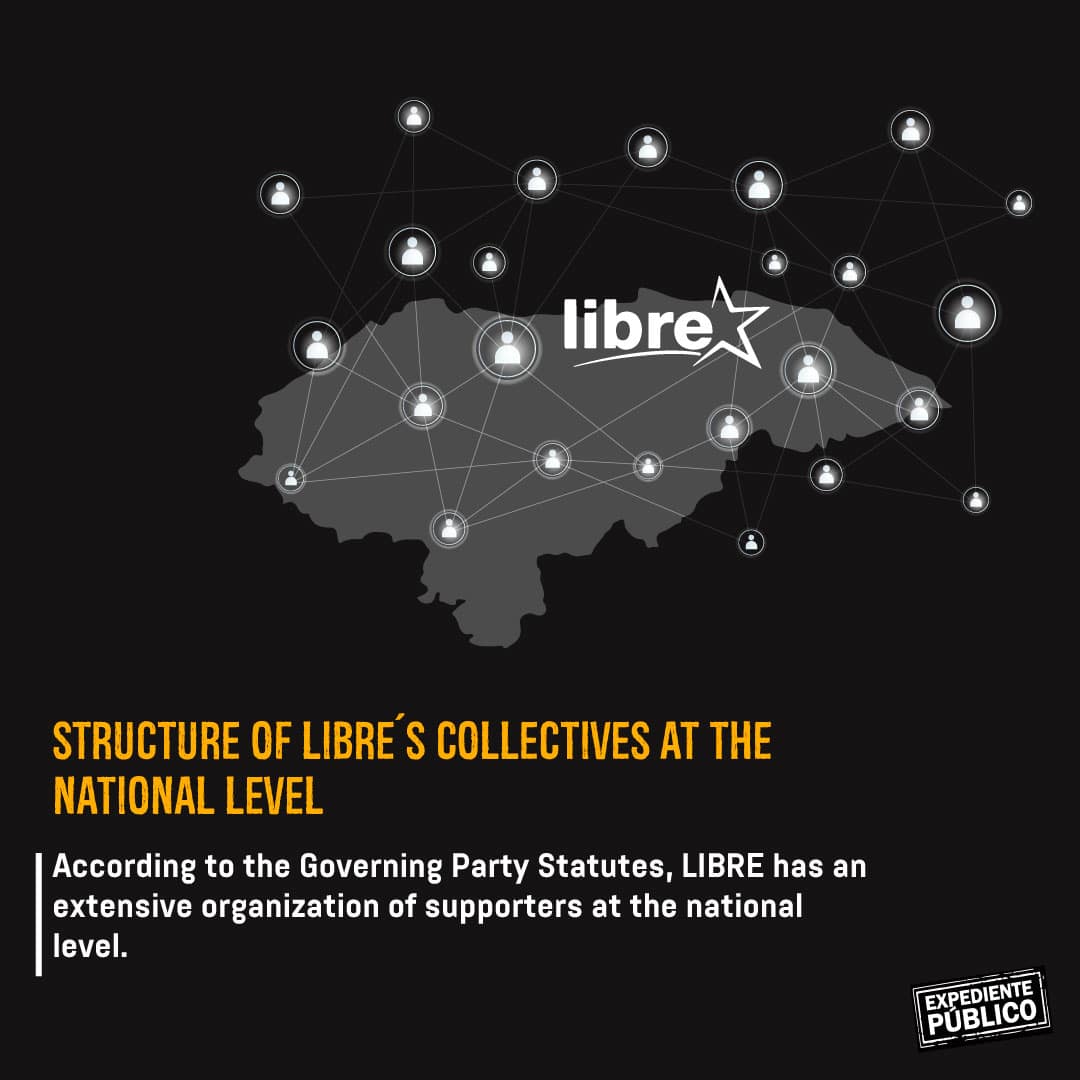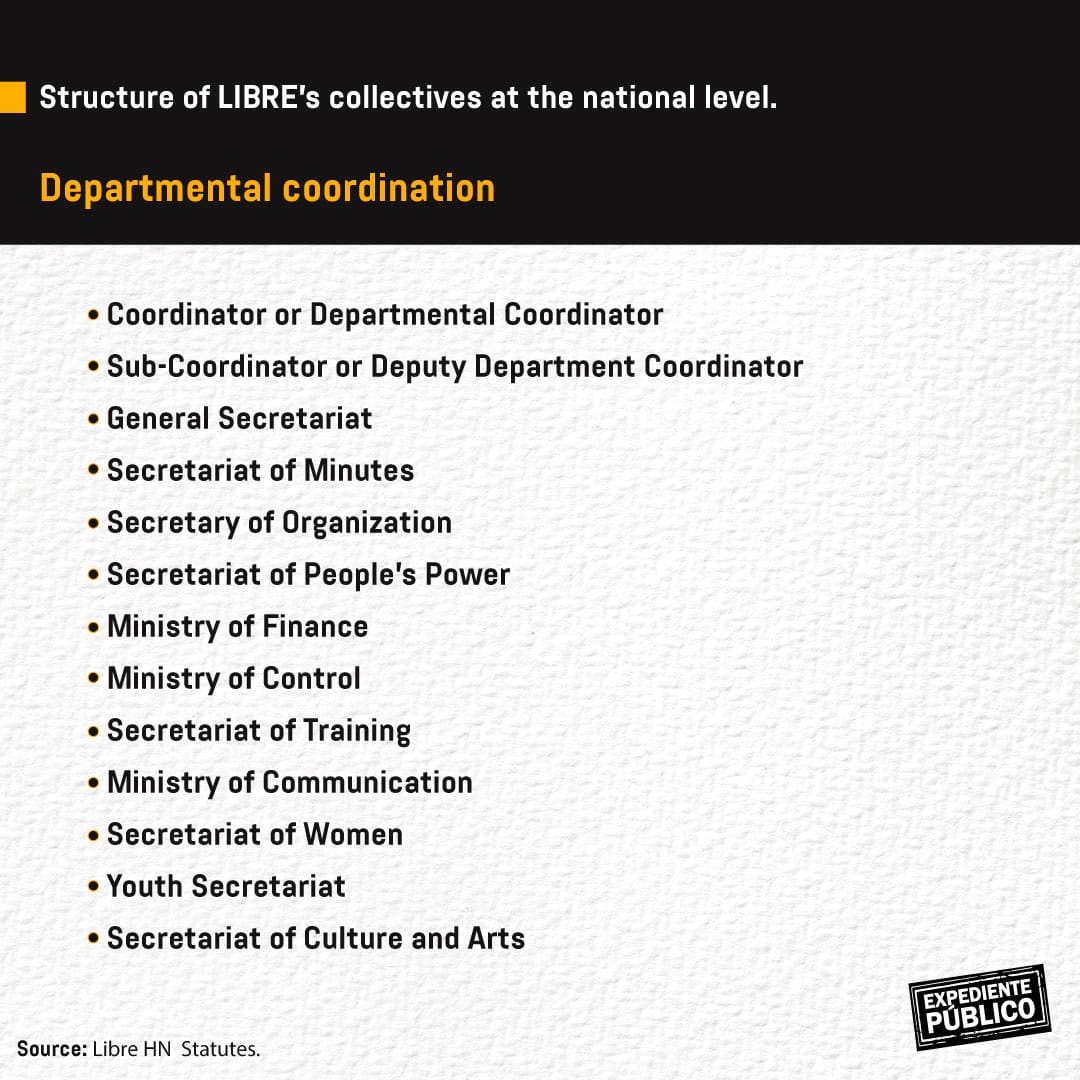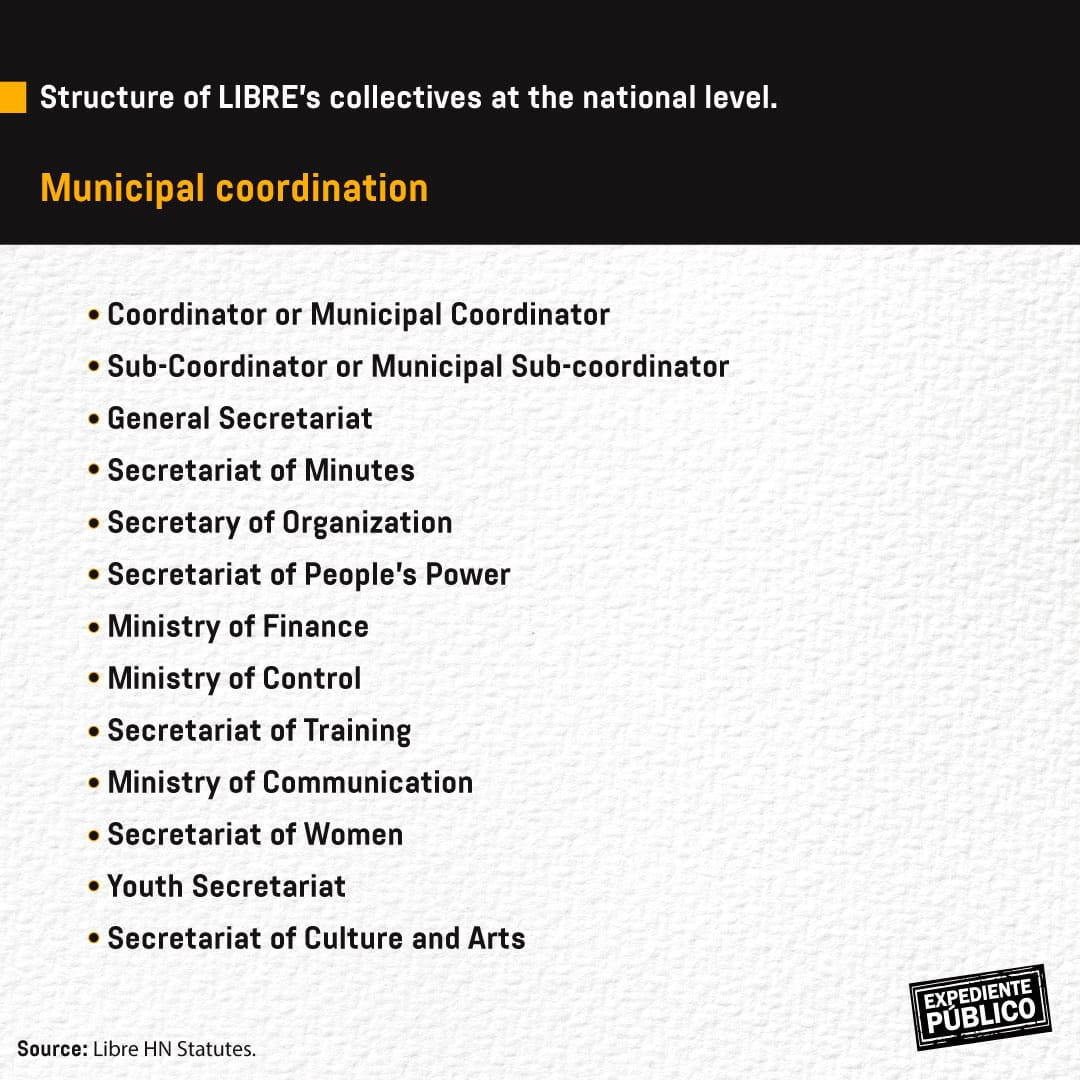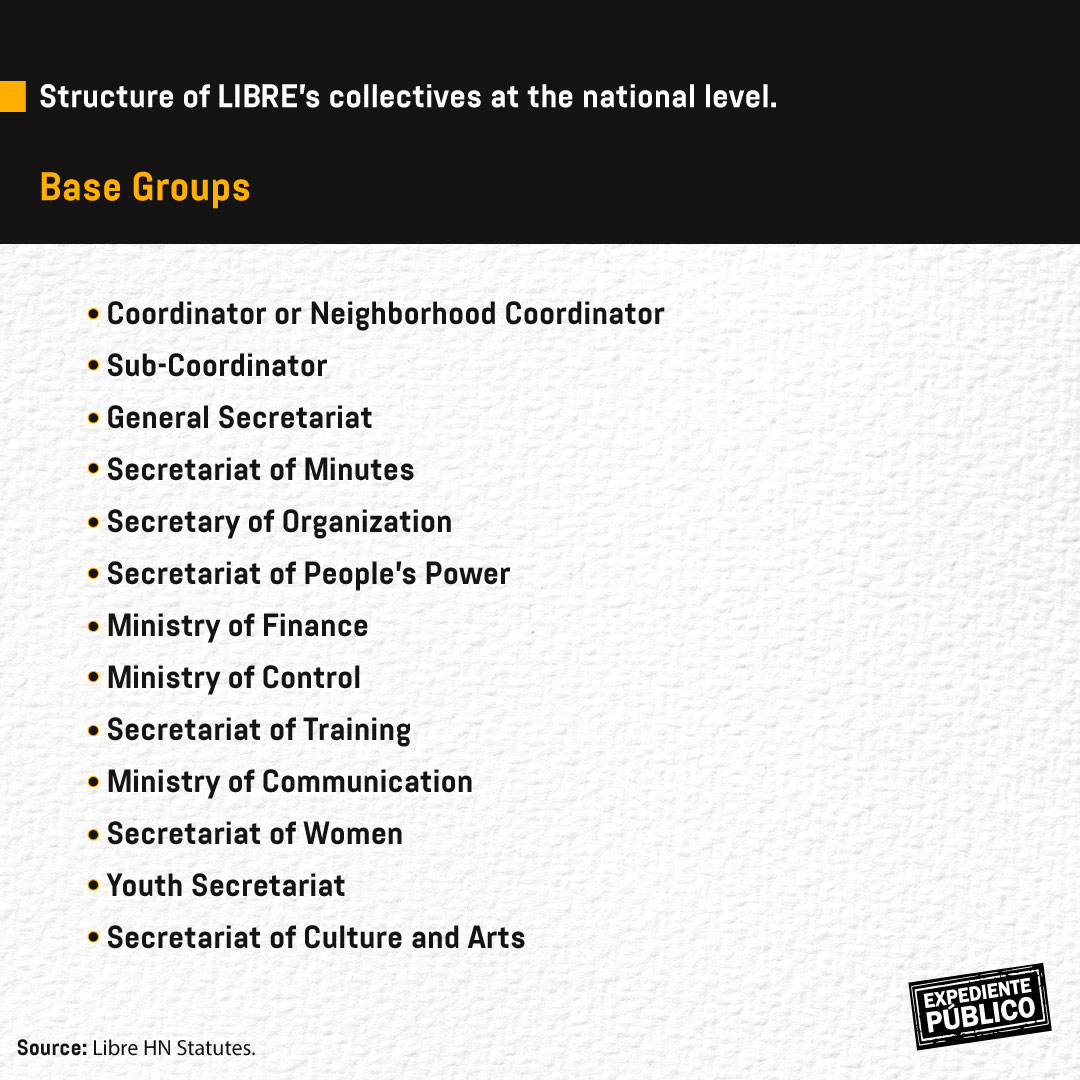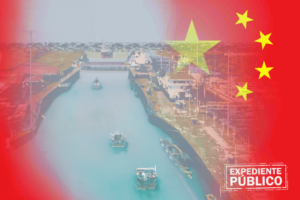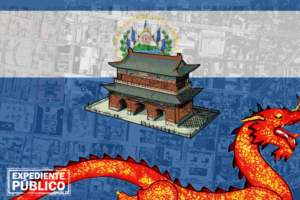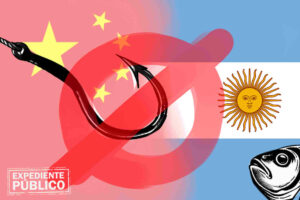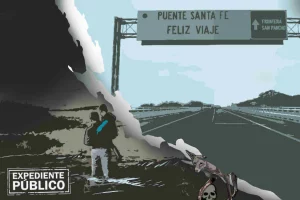*The roundtables for citizen participation could turn into the Revolutionary Defense Councils (CDR in Spanish) in Cuba, Councils of Civic Power (CPC) in Nicaragua and “colectivos” in Venezuela, and local networks espionage and shock troops which attack political opponents.
**The abolition of the National Forum for Convergence (FONAC in Spanish) has triggered the Law on Roundtables for Citizen Participation’s entering into national discussions in the coming days.
***Experts advise being vigilant of the law to avoid its conversion into a repressive mechanism to spy on the opposition.
Expediente Público
In Honduras, grassroots political groups have proliferated the landscape, under the order of former President Manuel Zelaya, and systemically interrupted multiple public and private institutions requesting jobs.
These groups are known popularly as “colectivos” and represent a new way of organizing that plays a key role in mobilizing the political interest of the Libre Party.
In general, the Revolutionary Defense Councils (CDR in Spanish) in Cuba, Councils of Civic Power (CPC) in Nicaragua, and the “colectivos” in Venezuela have served as local espionage networks of the governments in these countries and have responded as shock troops during protests of political opponents. Currently, in Honduras, the government of Xiomara Castro is proposing to create mechanisms for citizen participation. Will the roundtable discussions be used by these organizations for the same ends as they are in other countries with authoritarian regimes?
The recent bill presented by the executive branch of Xiomara Castro that seeks to create roundtables for citizen participation created controversy because of its intention to do away with the National Forum for Convergence. This initiative is only an example of the current public opinion in Honduras associated with former President Juan Orlando Hernández. Moreover, experts are warning about potential alarm bells that the project could allow for mechanisms of repression and espionage of citizens.
Regrettable track records in Cuba, Nicaragua, and Venezuela
“The issue over whether a mechanism of this nature is working in tandem with a government party that seeks to strengthen its political position and create a Constituent Assembly to reestablish the political system in Honduras, in addition to the instrument’s traditions or relationships with social organizations indicative of clientelism should be evaluated,” Armando Chaguaceda, the Cuban political scientist and historian expressed to Expediente Público in an interview.
In countries such as Nicaragua, Venezuela, and Cuba, the regimes of chavismo, sandinismo, and castrismo have sold certain models of civic involvement to their populations as being inclusive and tied to state decision-making; however, over time, the real purpose of these models have been to impose mechanisms of control and espionage and even shock troops and paramilitary groups on the population.
The Law on Roundtables for Citizen Participation, which was presented to the National Congress of Honduras on September 22, 2022 but has not yet been discussed by parliament, is currently under review by a committee headed by Congressman Rafael Sarmiento.
Read: Represión e impunidad, los métodos de tres dictaduras: Cuba, Venezuela y Nicaragua
The government will lead more roundtables for citizen participation
The Law on Roundtables for Citizen Participation, according to Article 1 of the Bill, “will be a national mechanism for open dialogue and civic participation among diverse sectors of society.”
One of the most criticized parts of this initiative is that the government will lead this participation. In Article 3, the Bill mentions that the Office of Strategic Planning, which would be chaired by Minister Ricardo Salgado, “will be the responsible body for the organization and proper functioning of this instance for a citizen-oriented democracy.”
Ricardo Salgado is a sociologist and writer, activist, and founding member of the Libre Party, making him a key player for Xiomara Castro’s cabinet of advisors to ensure the fulfillment of her “national plan and the construction of a democratic socialist state,” according to the legislative decree that created the Office of Strategic Planning.
Salgado has actively participated in the political arena since the foundation of the Libre Party on June 26, 2011, and up until his coming into power in 2022. He served as the political party’s representative in international relations during the period of 2013 to 2016. Likewise, he served as an advisor to both attorney Rixi Moncada of the National Electoral Council (CNE) (2019-2021) and the General Coordinator of the Libre Party Manuel Zelaya (XXXX-XXXX).
This is not autonomous participation
For Chaguaceda, democratic participation ceases to be autonomous the moment that it is invoked by the State and its only official political party,” and it denotes “an attempt to legitimize policies decided by the governing party, where participants resemble activists rather than citizens with pluralist ideas.”
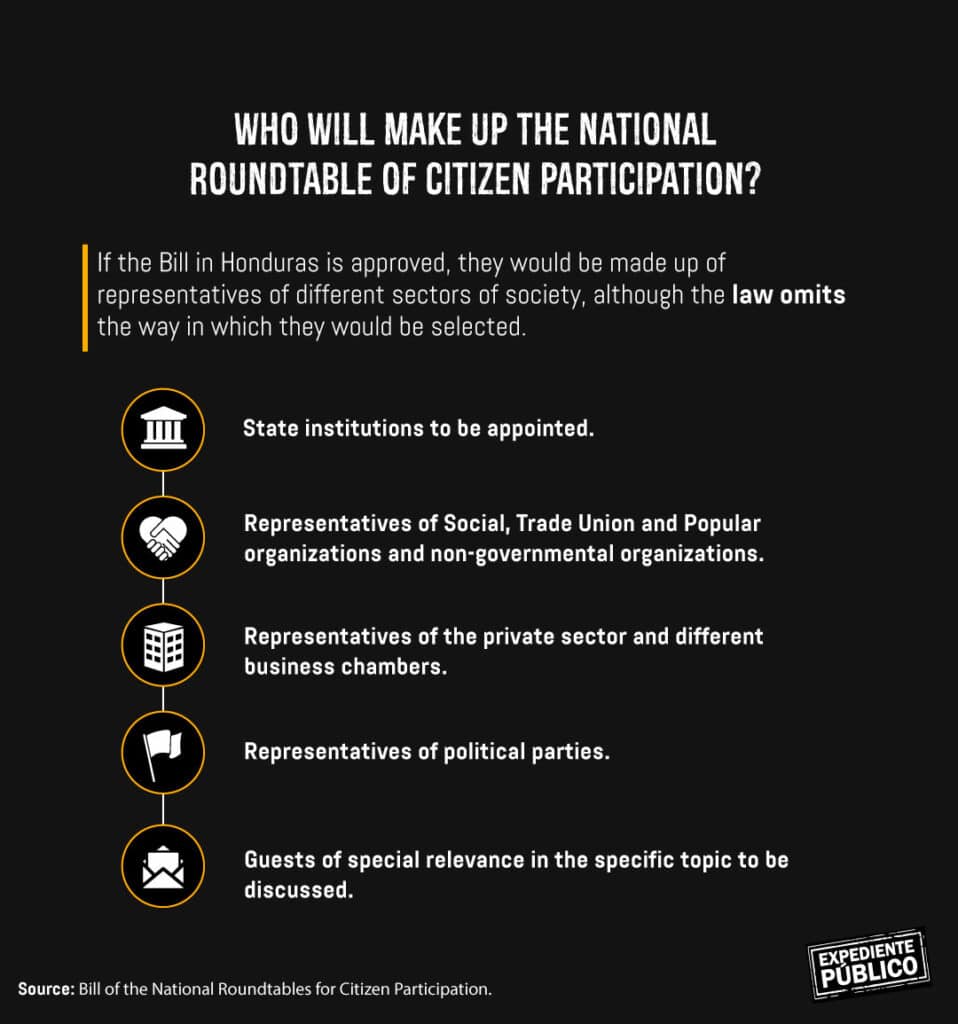
The makeup of these roundtables for civic participation will be voluntary, according to the leader of the Libre Party, Gilberto Ríos, in an interview with Expediente Público. He continued, “Popular and citizen participation can be encouraged by the State, but it cannot be obligatory in nature.”
However, Ríos considered the importance of administrating the citizen dialogues, “as many sectors of society hope to be considered and we are talking about a society that has never been consulted by the State and experienced a 13-year dictatorship.
The proposed law makes no specific mention of the requirements that must be part of the roundtables and is vague in comparison with other laws, such as that which creates the FONAC, which does mention these requisites in an explicit manner.
Encouraging participation
Joaquín Mejía, attorney and expert with a Ph.D. in human rights, told Expediente Público that “any space that implies citizen participation should be viewed highly.”
Moreover, not only Joaquín Mejía but also Gilberto Ríos agrees that after various years under a government categorized by different sectors of society as being a “narco dictatorship” and closed off to civic participation, it is positive that new mechanisms for dialogue are created for groups with different points of views.
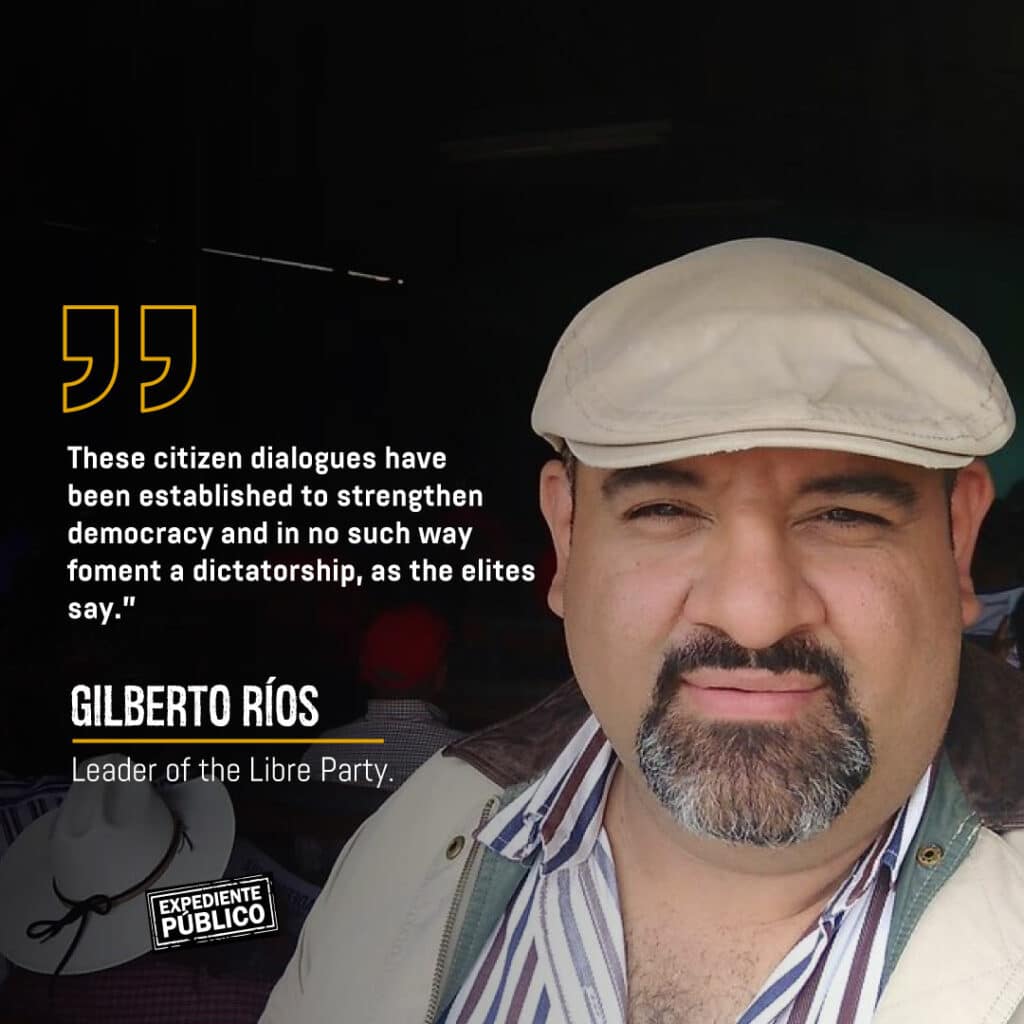
In an interview with Expediente Público, the minister of Strategic Planning for the Department of State, Ricardo Salgado expressed the purpose of this project for citizen participation as “everyone having the ability to organize to democratize decision making in the country.”
According to the bill, those societal sectors that will make up the citizen dialogues are the private sector, interest groups and non-profit organizations, and representatives of political parties, among others. For Mejía, it was important to highlight the political makeup of the roundtables.
“When I read the bill and see those who have been selected to participate, I praise it because Honduras has needed to achieve a political consensus for a long time, according to the Reflection, Research, and Communication Group (ERIC in Spanish), an analysis unit within the Radio Progreso Jesuits,” said Mejía.
However, the bill is not clear in failing to mention what the dialogues will discuss, as the document only points to the representatives of the discussions as “being summoned by the Office of the President or the Office of Strategic Planning of the Department of State according to the topic that will be discussed.”
Read: Nicaragua: Gobierno de Ortega gasta fondos públicos sin tomar en cuenta a los ciudadanos
Libre “colectivos” under scrutiny
Chaguaceda said to be on the lookout for citizen dialogues that turn into situations like those that Nicaragua, Cuba, and Venezuela have experienced, where there are Citizen Power Councils (CPCs) that supposedly were created by the government to encourage dialogue and consensus but that immediately became mechanisms of control and espionage at the local level.
“In the case of dictatorships and autocracies, these institutions are not created to widen civic participation but rather, to manipulate the population,” said Chaguaceda.
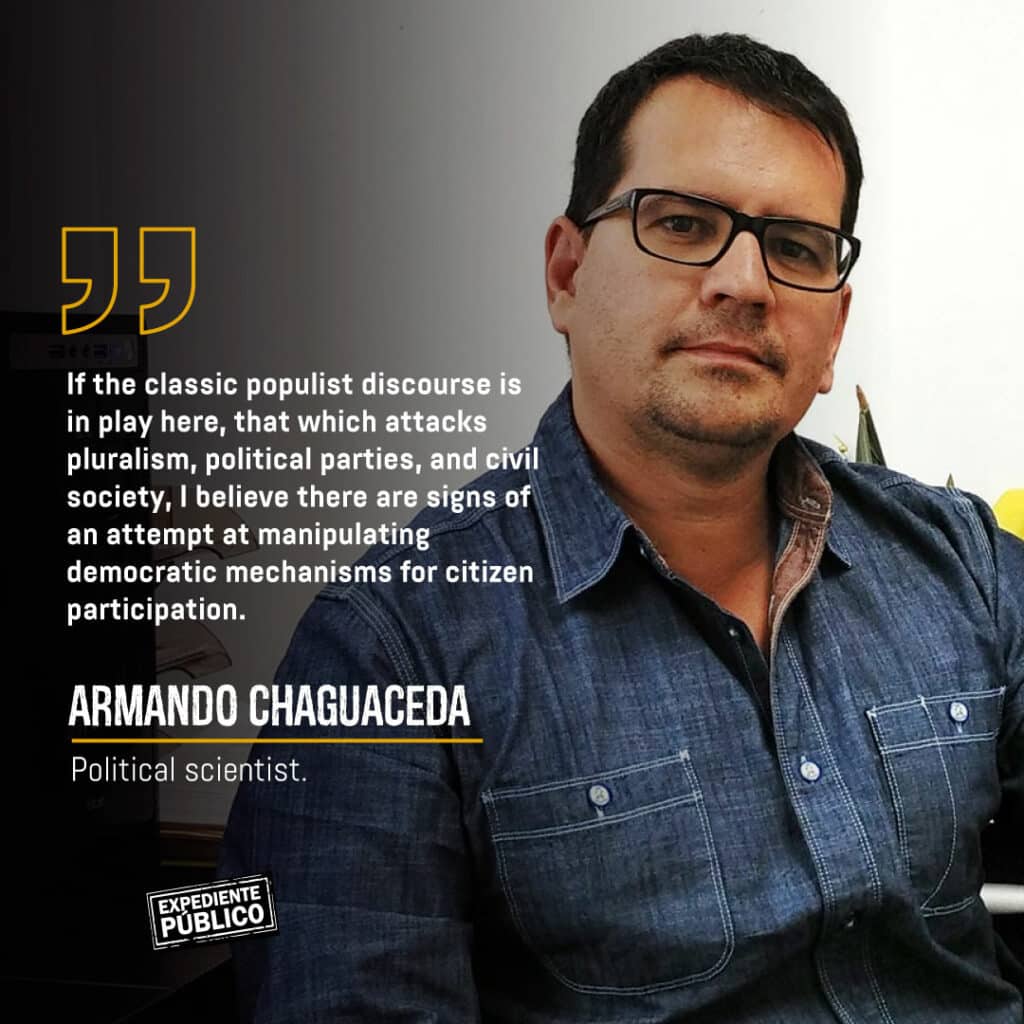
The political scientist suggested prudence given countries’ experiences in Central America, where autocratic governments are consolidating their power.
Political hierarchies
In the statutes of the ruling party, there is mention of the “colectivos” or grassroots groups as the “fundamental base of LIBRE that operates in villages, neighborhoods, work centers, and all other municipal areas where LIBRE is active through political membership.”
Likewise, “grassroots groups should organize according to the structure of the Municipal Coordination for LIBRE,” Article 74 reads.
Moreover, there have been speculations that the grassroots organizations of the Libre Party could be used as a mechanism similar to that of the CPC in Nicaragua; however, the organizations in question rejected these claims in an interview with Expediente Público.
Gustavo Matamoros, the coordinator of one of these groups in the Honduran capital city, recognized that the “colectivos” or grassroots organizations form “the organic structure of Libre Party” in the neighborhoods.
Matamoros continued by saying that “everyone can organize but the name, “colectivo,” which the Libre Party uses, represents a political structure; therefore, if we have a leader, José Manuel Zelaya Rosales, who is the general coordinator, the grassroots organizers stem from his leadership.”
The grassroots organizations of the Libre Party were formed after the coup d’état of 2009, and with the arrival of the party to power, they gained force and now function as the linkages between communities in Honduras and the government.
“They are the party’s operative arm and are normally tied to representatives who, prior to being elected, were political leaders. In other words, he or she who holds a popularly elected position first must have campaigned and organized supporters who would help with his or her discourse. These organized supporters are “colectivos,” said Minister Salgado.”
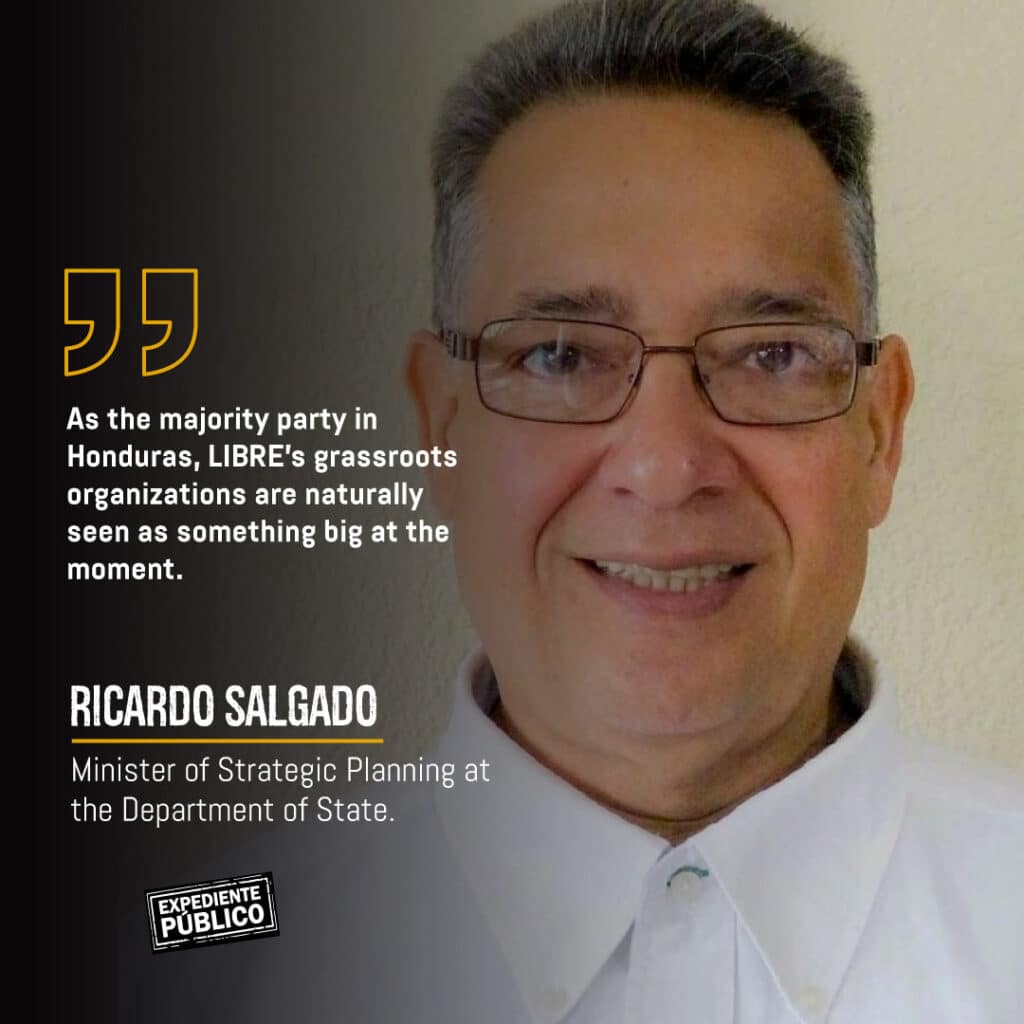
These “colectivos” function under a vertical hierarchy: from basic neighborhood units to coordination at the national level. Matamoros explained to Expediente Público that “in each sector, there is a “colectivo” that is led by a coordinator, deputy coordinator, and 11 secretaries.
Neighborhood “colectivos” are grouped by territory. In Tegucigalpa, there are 28 territories. The territories are managed at the municipal level, and there are a total of 298 municipal structures in Honduras.
Above the municipal leadership are the departmental coordinators, whose positions are in the hands of former President Manuel Zelaya Rosales, husband and current advisor to President Xiomara Castro, and who handle coordination at the general level.
Political leaders are now “commanders”
“We receive orders from our commander in chief Xiomara Castro de Zelaya, our commander José Manuel Zelaya Rosales, and our department coordinator Mario Osorto to carry out a certain political activity and with that, a new structure forms,” said Matamoros.
Mario Osorto, an attorney by profession, is the current representative of the incumbent Libre Party before the Central American Parliament. He is also the head of the party in the department of Francisco Morazán.
In addition to political activities, these grassroots groups accompany and assist the government when it wants to provide aid or social assistance.
“We were told that we had money from Venezuela, Nicaragua, and the communist countries, but that never happened and each one of us has paid for our own political activities,” Matamoros said in early October as he helped to coordinate an activity to hand out energy-saving light bulbs in a neighborhood in the capital of Honduras.
Said activity, which was attended by members of Expediente Público, was announced by the Department of Energy (SNE), but the “colectivos” facilitated the organization and development strategy of the initiative. Coordinators of different sectors within the La Kennedy neighborhood in Tegucigalpa accompanied the SNE technicians in the house-to-house delivery of energy-saving light bulbs.
Regarding the role that the “colectivos” play within the citizen roundtables, Salgado referred to “the ‘colectivos’ as the party’s operative arm” but said that the “citizen roundtables speak to all Honduran society, as their reach goes beyond political parties.
Also: ¿Quién manda en Honduras? Xiomara Castro a la sombra de su esposo Manuel Zelaya
The abolition of the FONAC
To date, the organization that currently plays this role is the FONAC, which entered the Honduran political landscape in November 1994. The main purpose of this governmental body is to formulate the system for monitoring and reporting on the progress of the execution of the National Plans.
However, the lifespan of the FONAC lies in the lands of the congressmen since the approval of this bill would mean the immediate dissolution of the agency.
“When the Forum for National Convergence ceases to exist, all of its legal attributes and mechanisms will be assumed by the National Roundtable for Citizen Participation,” reads Article 6 of the law.
The current director of the FONAC is Omar Rivera, who has endorsed many actions of the Hernández government, such as the acquisition of mobile hospitals for patients with COVID-19, which resulted in one of the largest nationwide scams and losses of $47 million dollars for seven defective units.
Also read: Corrupción pandémica con hospitales móviles en Honduras
He is also accused of having accompanied several projects promoted by the government of Juan Orlando, as he was a member of the commission to remove police officers, an operation that separated some 3,100 policemen from their ranks while leading to the prosecution of very few cases.
As director of the FONAC, Rivera has also been criticized for remaining silent on polemic events such as the reelection of President Hernández in 2017 and the removal of supreme court justices in 2012.
The nomination of Rivera as director of the FONAC in 2020 tarnished the image of the social watchdog agency, according to experts.
“I believe that many societal sectors are critical of what has happened and what continues to occur in this country, and we consider it necessary to eliminate the FONAC,” said Mejía in an interview with Expediente Público.
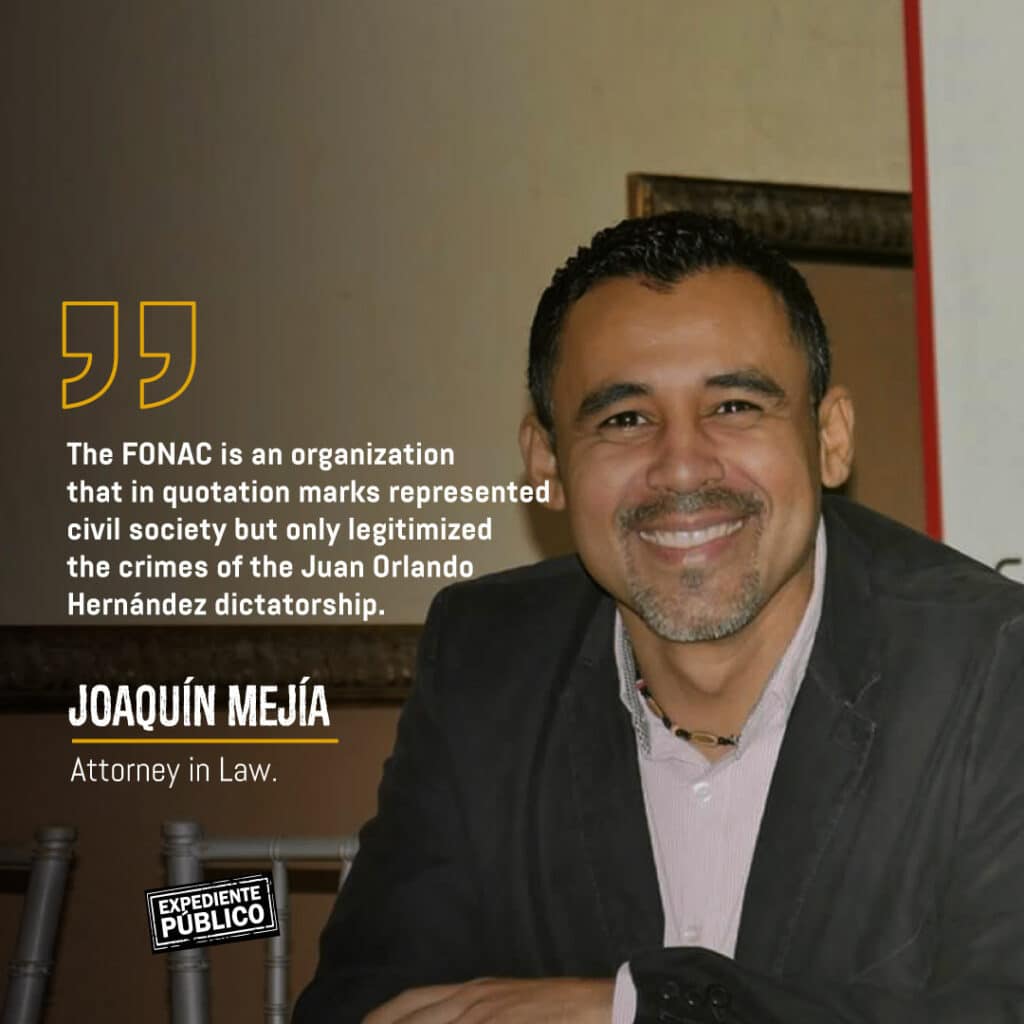
Article 6 of the bill has also raised suspicions because it orders a representative of the Citizen Roundtables to integrate the Generally Assembly of the National Anti-Corruption Committee (CNA) to substitute representation from the FONAC.
It also remains to be seen who will be designated for that position because the government will oversee the nomination. The president of Honduras will be responsible for instructing the Secretary of State to select the representative.
This section has been criticized because it could lead to the altogether elimination of the CNA, to the point of influencing its decisions, something which has been denied by both pro-government deputies and government officials.
Such is the case of Salgado who said that the “CNA in no moment would be subject to such an attack on our part” and considered that instead, “a campaign has been created to give the organization some visibility and relevance.”
“I want to emphatically reject the information circulating on using the power of the State to eliminate the CNA; this can only be the result of a perverse campaign against the National Congress since in no part of the citizen roundtable project is such a thing discussed,” expressed the vice president of the CNA, Hugo Noe Pino in a press conference held in the basement of the CNA headquarters on September 27, 2022.
The path to the Constituent Assembly
The political scientist Chaguaceda advised civil society members to be aware of any attempt to use this participatory instrument as a way of allowing for a new Constituent Assembly.
This bill should be properly evaluated to see if it goes hand-in-hand with the suspicion that there is going to be an attempt at restructuring by means of a Constituent Assembly,” he assessed.
Likewise, the Cuban historian said that sometimes the projects of the Constituent Assembly lend themselves to manipulation, although he clarified that he was not referring to the case of Honduras. “This manipulation lies in overrepresentation regarding the design of the call to citizens, taking advantage of the popularity of a certain leader or possibilities for supporters.”
In contrast, Mejía said that while it was not necessary to install citizen roundtables to open a Constituent Assembly, if such a thing was done, there was no need to be afraid of these types of processes because a new constitution should be established regardless because of the 2009 coup d’état.
Paradoxically, the coup d’état, which occurred on June 29, 2009, during the presidency of Manuel Zelaya, caused the president to leave the country by force, where he was taken to Costa Rica, through a project called the “Fourth Ballot Box,” whose purpose was to carry out a referendum for Hondurans to decide whether they wanted to hold a National Constituent Assembly and thus add new text to the constitution.


